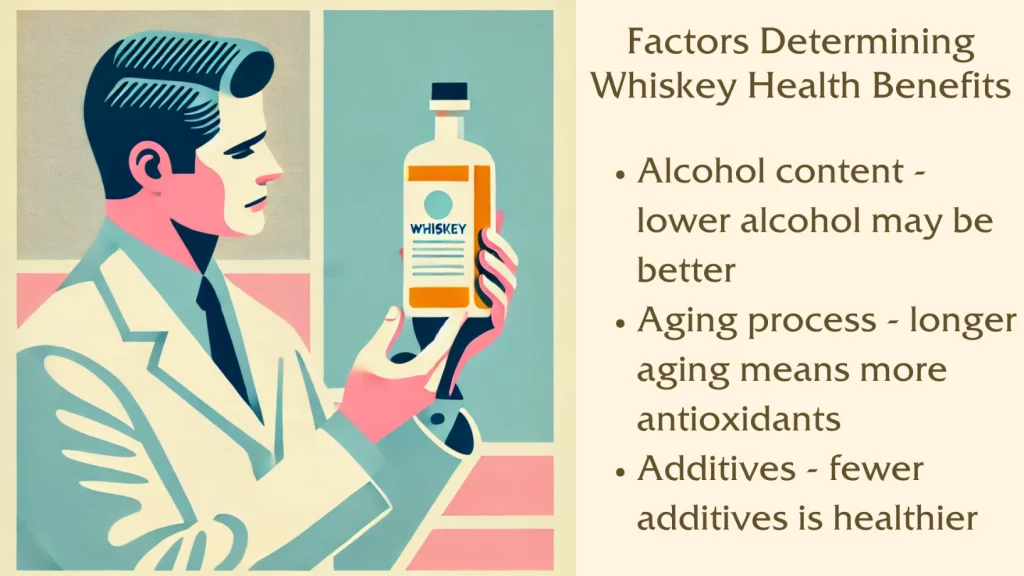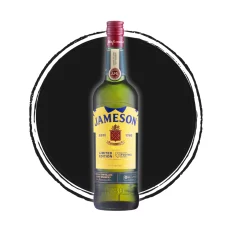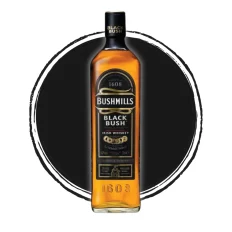More Articles

Best Healthy Whiskeys
If you’ve ever wondered how to enjoy your favorite spirit in a way that aligns with a healthy lifestyle, you’re…
Whiskey lovers, rejoice! If you’ve ever wondered how to enjoy your favorite spirit in a way that aligns with a healthy lifestyle, you’re in for a treat. Our guide to the “Top 10 Healthiest Whiskeys” is here to shed light on how whiskey can be part of a health-conscious diet.
From the antioxidants that battle free radicals to the absence of sugar and gluten, we explore the factors that make whiskey a surprisingly suitable option for those looking to indulge responsibly. Whether you’re a fan of the smoky, medicinal qualities of a good Laphroaig or the smooth, low-toxin allure of Glenlivet 12, we’ve got you covered. Plus, we’ll dive into how to enjoy whiskey in a healthy way, emphasizing moderation, the choice of mixers, and the importance of staying hydrated.
Get ready to sip smarter and savor the rich, complex flavors of whiskey without compromising your wellness goals. Cheers to a balanced approach to enjoying the finer spirits in life!
Factors determining whiskey’s health benefits
Whiskey and bourbon’s potential health benefits are shaped by several key factors, including its alcohol content, antioxidant properties, and its naturally low sugar and gluten-free composition. When consumed in moderation, whiskey’s alcohol content can promote improved circulation and cardiovascular health by relaxing blood vessels, though excessive consumption negates these benefits and poses significant health risks.

Additionally, whiskey contains ellagic acid, a natural antioxidant known to help neutralize free radicals, which are harmful molecules that can damage cells and contribute to aging and disease. Unlike many other alcoholic beverages, whiskey is free of added sugars, making it a lower-calorie option that can align with a health-conscious lifestyle when consumed responsibly.
Furthermore, its gluten-free nature makes it a suitable choice for individuals with gluten sensitivities or celiac disease, provided it has been distilled properly. By understanding these attributes, individuals can make more informed decisions about incorporating whiskey into their routines, ensuring that enjoyment aligns with overall wellness goals.
Alcohol content: Lower may be better
Lower alcohol concentrations in whiskey and bourbon are often considered more beneficial for health because they reduce the risks associated with excessive alcohol consumption while still allowing for the enjoyment of whiskey’s potential health-promoting properties. Alcohol in high concentrations can strain the liver, impair cognitive function, and increase the risk of addiction and other long-term health issues such as heart disease and hypertension. By choosing whiskey with lower alcohol by volume (ABV), individuals can minimize these risks while still benefiting from whiskey’s antioxidant compounds, such as ellagic acid, which may help combat oxidative stress.
Lower ABV options also encourage mindful drinking and make it easier to maintain moderation, which is key to unlocking the potential cardiovascular benefits of alcohol. Studies have shown that moderate alcohol consumption—typically defined as up to one drink per day for women and two for men—may support heart health by improving blood flow, increasing “good” HDL cholesterol, and reducing the risk of blood clots. However, exceeding these amounts quickly negates these benefits and introduces numerous health hazards.
| Whiskey Brand | Alcohol Content | Noted Health Benefit |
|---|---|---|
| Glenlivet 12 | 40% ABV | Lower risk of heart disease |
| Bushmills Original | 40% ABV | Reduced liver strain |
Aging process: Longer aged, more antioxidants
A longer whiskey aging process is associated with an enhanced nutritional profile, particularly due to the increased levels of beneficial compounds like antioxidants. During the aging process, whiskey interacts with the wood barrels, absorbing tannins and lignins, which are natural sources of ellagic acid. This antioxidant helps neutralize free radicals, unstable molecules that can damage cells and contribute to aging and chronic diseases. The extended contact with the wood allows more time for these beneficial compounds to infuse into the whiskey, resulting in a richer, more complex flavor profile and higher concentrations of health-promoting antioxidants.
In addition to boosting antioxidant levels, longer aging also helps to mellow the alcohol content and balance the overall composition of the whiskey. Harsh volatile compounds are reduced over time, making the whiskey smoother and easier to sip, which may encourage moderation in consumption. While longer aging doesn’t eliminate the risks associated with excessive drinking, it does enhance whiskey’s potential for delivering a more enjoyable and health-conscious experience when consumed responsibly.
| Whiskey Brand | Age | Antioxidant Benefit |
|---|---|---|
| Lagavulin 16 | 16 years | High levels of ellagic acid |
| Macallan 18 | 18 years | Enhanced free radical-fighting capabilities |
Additives: Fewer additives, purer experience
Whiskeys with fewer additives provide a cleaner, more authentic tasting experience and are increasingly favored by health-conscious consumers. Additives such as caramel coloring (E150a) and added sugars are often used to enhance appearance and flavor, but they dilute the purity of the spirit. Caramel coloring, while generally safe, adds unnecessary chemicals and can sometimes mask the true quality of the whiskey. Added sugars increase calorie content, detracting from whiskey’s natural advantage as a lower-sugar alcoholic option. By choosing additive-free whiskeys, consumers can enjoy a more genuine representation of the distiller’s craft and a drink that aligns better with a mindful lifestyle.
Beyond taste, avoiding additives contributes to a healthier drinking experience. Natural whiskeys rely on high-quality ingredients and traditional distillation processes to develop their flavor profiles, resulting in a product free from artificial enhancements. These whiskeys allow drinkers to savor the nuances created by the grains, yeast, and aging barrels, emphasizing the artistry and authenticity of the spirit. For health-conscious individuals, additive-free options reduce exposure to unnecessary chemicals and excess sugar, ensuring that each sip delivers a pure, unaltered expression of whiskey as it was meant to be enjoyed.
| Whiskey Brand | Additives | Health Consideration |
|---|---|---|
| Talisker 10 | None | No unnecessary chemicals |
| Laphroaig 10 | None | No added sugars |
Criteria for selecting healthy whiskeys
When embarking on the quest to select a healthy whiskey, a few critical criteria should guide your choice. Firstly, prioritize whiskeys made with organic ingredients. These ingredients ensure the whiskey is crafted without the use of harmful pesticides, thereby reducing your exposure to toxins.

Secondly, opt for whiskeys without added flavors or sugars. This choice guarantees a purer whiskey experience and sidesteps unnecessary calories, aligning with a healthier lifestyle. Lastly, the type of cask used in the aging process deserves attention, as it can significantly influence the whiskey’s antioxidant content.
Certain woods can enhance the whiskey’s health benefits, making the cask selection a pivotal factor in your decision. Together, these criteria form a solid foundation for selecting a whiskey that not only pleases the palate but also aligns with health-conscious consumption.
Organic ingredients reduce toxin exposure
Whiskeys made with organic ingredients offer a cleaner, toxin-free drinking experience by avoiding the use of synthetic pesticides, herbicides, and fertilizers during the production of grains and other raw materials. These chemicals can leave trace residues that, while minimal, accumulate over time and pose potential health risks. Organic farming practices not only safeguard the integrity of the ingredients but also promote environmental sustainability by preserving soil health and reducing pollution. For health-conscious consumers, choosing whiskeys crafted from organic grains ensures a purer product, free from unnecessary exposure to harmful substances.
| Whiskey Brand | Organic Certification | Notes |
|---|---|---|
| Bruichladdich The Organic 2010 | Yes | Distilled using 100% organic Scottish barley, showcasing a commitment to environmental sustainability and reduced toxin exposure. |
| Benromach Organic | Yes | Certified organic by the UK Soil Association, this whiskey is matured in virgin oak casks, offering a unique flavor profile. |
No added flavors or sugars
Whiskeys without added flavors or sugars retain the integrity of their natural ingredients, providing a more authentic and health-conscious beverage. Artificial flavors and sweeteners, while designed to enhance taste, often overshadow the nuanced profiles that arise from the grains, fermentation, and aging process. Additionally, added sugars increase calorie content and can contribute to long-term health issues like obesity and insulin resistance. By opting for whiskeys that rely solely on traditional distillation and natural aging methods, consumers can enjoy a cleaner flavor and a drink that aligns better with a balanced lifestyle.
| Whiskey Brand | Added Flavors/Sugars | Notes |
|---|---|---|
| Glenlivet Nadurra | No | Crafted using traditional 19th-century methods, without the addition of flavors or sugars, emphasizing its natural taste. |
| Ardbeg Ten Years Old | No | Known for its deep, complex flavors derived purely from the distillation and aging process, with no added sugars or flavors. |
Cask type influences antioxidant levels
The type of cask used in the aging process significantly impacts the antioxidant levels in whiskey, with certain woods contributing more ellagic acid and other beneficial compounds. For example, oak barrels are renowned for their ability to infuse whiskey with tannins, lignins, and vanillin, all of which enhance its nutritional and flavor profile. Different cask treatments, such as charring or toasting, can further influence the levels of these compounds. Whiskeys aged in high-quality barrels not only develop complex flavors but also offer greater potential health benefits, as the antioxidants absorbed during aging can help combat oxidative stress and promote cellular health.
| Whiskey Brand | Cask Type | Antioxidant Influence |
|---|---|---|
| Lagavulin 16 Year Old | American Oak & European Oak | The use of both American and European oak casks is believed to enhance the whiskey’s antioxidant properties through the aging process. |
| Macallan Sherry Oak 12 Years Old | Sherry Casks | Aged exclusively in sherry casks, which are known to impart a higher level of antioxidants to the whiskey, enriching its health benefits. |
Top 10 Healthiest Whiskeys
In navigating the vast world of whiskey with a health-conscious lens, the Top 10 Healthiest Whiskeys emerge as standout choices. These selections prioritize organic ingredients, minimal additives, and aging processes that enhance antioxidant levels. The list ranges from the smooth, low-toxin Glenlivet 12 to the medicinal, intensely smoky Laphroaig 10, each offering a distinctive profile that caters to a healthier lifestyle.
Jameson Irish Whiskey and Bushmills Black Bush are noted for their purity and high antioxidant content, while Wild Turkey 101 is recognized for its high-proof benefits with less dilution. These whiskeys are chosen based on criteria that emphasize a purer whiskey experience, underscoring the importance of organic production, the avoidance of unnecessary additives, and the selection of cask types that boost health benefits. This guide is tailored for those seeking to enjoy whiskey in a manner that aligns with wellness goals.
| Whiskey | Key Health Attributes | Organic | No Added Flavors/Sugars | Cask Type Used | Unique Processing/Health Notes |
|---|---|---|---|---|---|
| Glenlivet 12 | Smooth, low in toxins | Yes | Yes | Traditional Oak | Meticulous distillation process reduces toxins, aged in traditional oak casks to enhance smoothness and purity. |
| Jameson Irish | Triple distilled, pure | No | Yes | Mixed | Triple distillation process for unmatched purity, uses a mix of sherry and bourbon casks for a unique antioxidant blend. |
| Chivas Regal 12 | Balanced, no added flavors | No | Yes | Oak | Aged in oak casks for a balanced flavor profile without artificial additives, focusing on natural ingredients. |
| Bushmills Black Bush | High in antioxidants | No | Yes | Sherry | Aged in sherry casks to enhance antioxidant content, known for its high levels of ellagic acid. |
| Johnnie Walker Black | Aged 12 years, complex | No | Yes | Various | Blend of whiskies aged at least 12 years in various casks, offering a complex flavor and increased antioxidants. |
| Balvenie DoubleWood 12 | Double cask, rich flavor | No | Yes | American Oak, Sherry | Unique double cask process in American oak and sherry casks for a rich flavor and potentially higher antioxidants. |
| Lagavulin 16 | Long aged, smoky antioxidants | No | Yes | Oak | Extensively aged in oak casks, known for its smoky flavor and potential antioxidant boost from the long aging process. |
| Wild Turkey 101 | High proof, less dilution | No | Yes | American Oak | High alcohol content with minimal dilution, aged in American oak for a robust flavor profile and healthful qualities. |
| Talisker 10 | Peated, metabolic benefits | No | Yes | Oak | Peated malt offers unique metabolic benefits, aged in oak casks for a distinctive flavor and health advantages. |
| Laphroaig 10 | Intensely smoky, medicinal qualities | No | Yes | Oak | Known for its medicinal qualities and intense smokiness, the aging process in oak casks enhances its health benefits. |
How to enjoy whiskey in a healthy way
Enjoying whiskey in a manner that aligns with a health-conscious lifestyle centers around several key guidelines. Moderation is crucial; adhering to a limit of 1-2 glasses allows one to appreciate whiskey’s benefits, like its antioxidant properties, without the downsides of excessive drinking. The Centers for Disease Control and Prevention (CDC) suggests that moderate drinking is up to one drink per day for women and two drinks per day for men, which aligns with enjoying whiskey in moderation.

Opting to avoid sugary mixers in favor of water or ice not only cuts down on unnecessary calories but also preserves the whiskey’s inherent flavors. For those looking to avoid sugary mixers, consider using natural alternatives like fresh lemon or lime juice, which can add flavor without the added sugars. Moreover, ensuring to stay hydrated by drinking water between servings of whiskey can counteract the dehydrating effects of alcohol.
A good rule of thumb is to drink a glass of water for every whiskey drink to maintain hydration levels. By following these strategies, enthusiasts can savor the depth and complexity of whiskey’s taste profiles while maintaining a healthful approach.
Drink in moderation: 1-2 glasses
Adopting a moderation-first approach is crucial for integrating whiskey into a health-conscious lifestyle. Limiting oneself to 1-2 glasses enables the enjoyment of whiskey’s complex flavors and potential health advantages without the downsides associated with overconsumption. This practice ensures that whiskey remains a pleasurable part of a well-balanced diet.
The World Health Organization (WHO) and other health bodies provide guidelines that echo the importance of moderation in alcohol consumption to mitigate health risks.
Avoid sugary mixers: Use water or ice
To enhance the healthfulness of whiskey, it is recommended to avoid sugary mixers. Choosing water or ice as alternatives not only lowers calorie intake but also preserves the whiskey’s authentic taste. This adjustment maintains the integrity of the whiskey experience, catering to those who prioritize health without compromising on flavor.
For those seeking variety, consider adding a splash of sparkling water or a few drops of bitters to add complexity to your whiskey without significant calories.
Stay hydrated: Drink water between whiskeys
Maintaining hydration is essential when consuming whiskey. Drinking water between whiskeys helps mitigate the dehydrating effects of alcohol, supporting overall health. This habit allows whiskey aficionados to savor their preferred beverages while safeguarding their hydration levels, promoting a balanced approach to whiskey consumption.
Hydration is key to avoiding negative effects of alcohol, and ensuring a glass of water is consumed between drinks can help maintain this balance.





